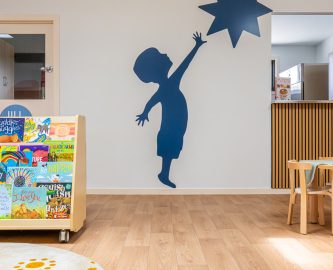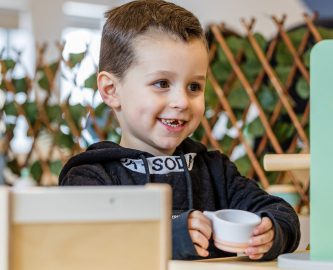Connection vs Disconnection: The Power of Presence in Early Childhood
At North Star Early Education, we believe that strong, meaningful connections are the foundation for a child’s development—and new insights from the Murrindindi Children’s Network 2025 Early Childhood Conference have only reinforced this.
Our Operations Manager, Sam, and Centre Manager at North Star Wallan, Taila, recently attended a powerful session on Exploring Neurodevelopment presented by Robyn Papworth, a respected Exercise Physiologist and Developmental Educator. The session focused on the difference between connection and disconnection, particularly in the context of growing screen use and reduced face-to-face interaction.
Why Joint Attention Matters
Joint attention is more than simply interacting with a child. It is the act of sharing a moment and checking back to ensure mutual engagement. For example, asking “Can you see that cloud shaped like a heart?” and then confirming the child is looking too—that is joint attention.
This seemingly small act is crucial. It supports:
-
Language development and word learning
-
Understanding of facial expressions and gestures
-
Stronger social and cognitive development
-
Nurturing emotional bonds between children and caregivers
When joint attention is disrupted—often by screens or distraction—these essential areas can suffer.
Connection Starts with Simple Acts
True connection does not require fancy resources. It can be found in:
-
Eye contact and physical presence
-
Shared attention and turn-taking
-
Sensory engagement, rhythm, and movement
Even something as simple as giving yourself a “high five” in the mirror each day can release oxytocin, the bonding hormone, and reset your mood and mindset.
Screen Time Recommendations
As educators and parents, it is important to be mindful of how much screen exposure children are getting, especially during their early years. The guidelines recommend:
-
Under 2 years old: No screen time
-
2 to 5 years: 1–2 hours per day (maximum)
Excessive screen time is linked to:
-
Reduced language exposure
-
Fewer back-and-forth interactions
-
Limited sensory input
-
Decreased eye contact and joint attention
Activities That Encourage Connection
Here are some fun, screen-free ways to foster rich, developmental connection with your child:
-
Bubbles: Encourage movement, breath control, and joyful turn-taking
-
Scarf Dancing: Stimulate imagination, sensory play, and motor skills
-
Masking Tape Pathways: Create roads, mazes, or shapes to explore
-
Cup Challenges: Stack, tap, build, and knock down—creativity meets fine motor development
-
Body Percussion: Clap, tap, stomp, and move—music through the body
-
Shadow Play: Explore nature and science by tracing and observing shadows throughout the day
Music can also be used to support connection. By singing rather than relying on recorded songs, you can match the child’s processing speed, slow down or energise the moment, and foster a shared experience.
Practical Tools for Everyday Moments
Struggling with activities like messy play? Try using a timer. Knowing the experience is time-bound can reduce stress and make it more manageable—for both adults and children.
At North Star, we are committed to fostering environments that prioritise connection over distraction. Every moment of shared attention lays the groundwork for a child’s confidence, curiosity, and communication.
Let us continue building a world where children are truly seen, heard, and connected.


